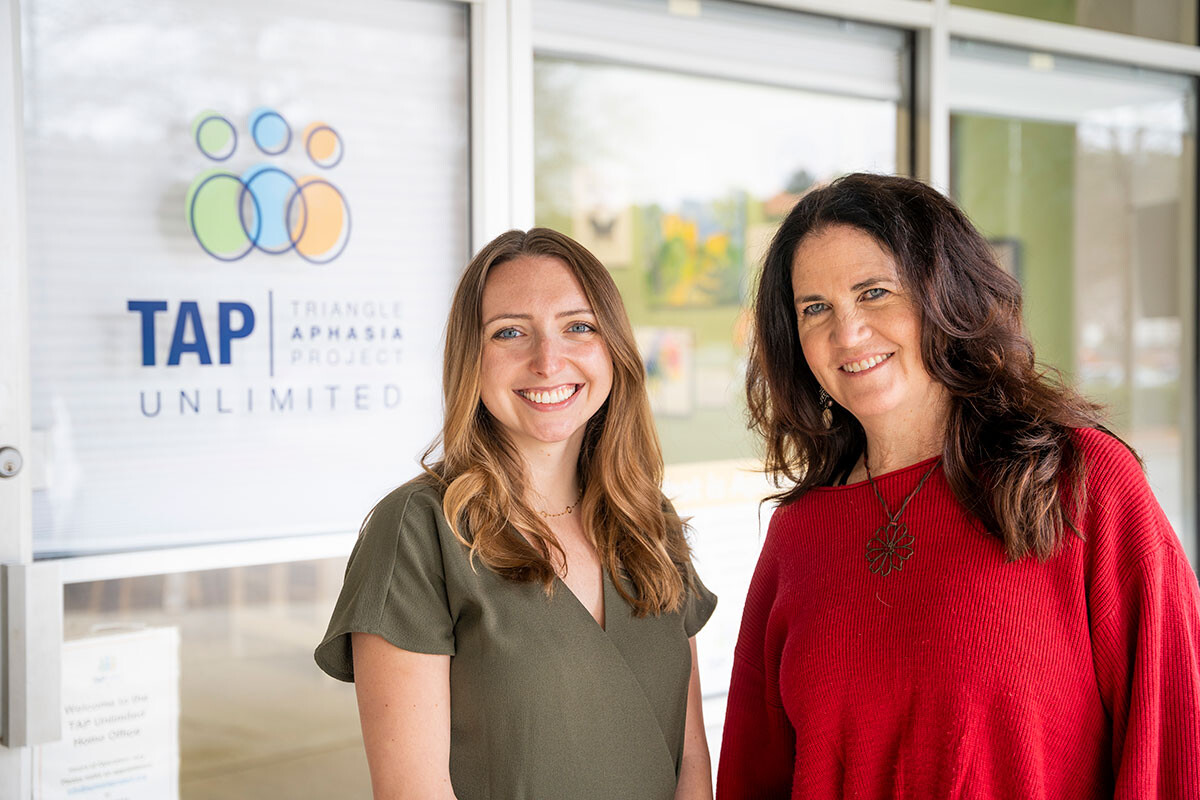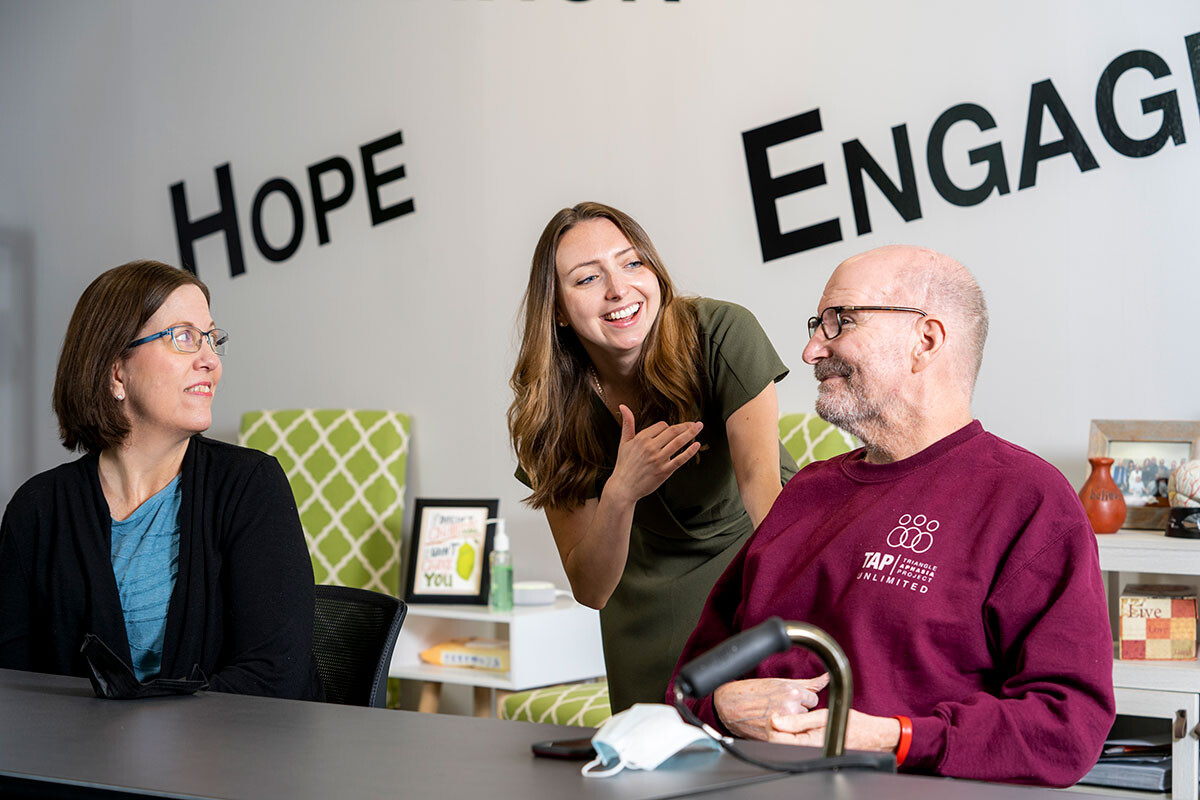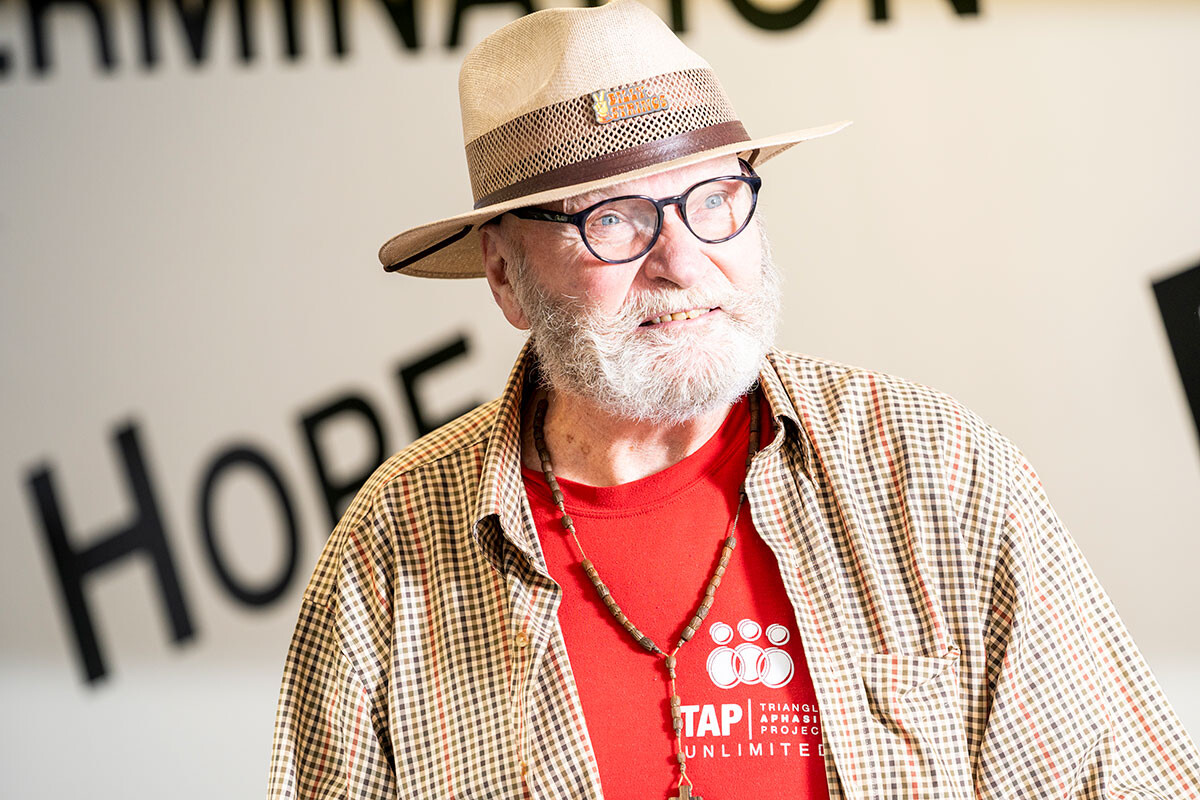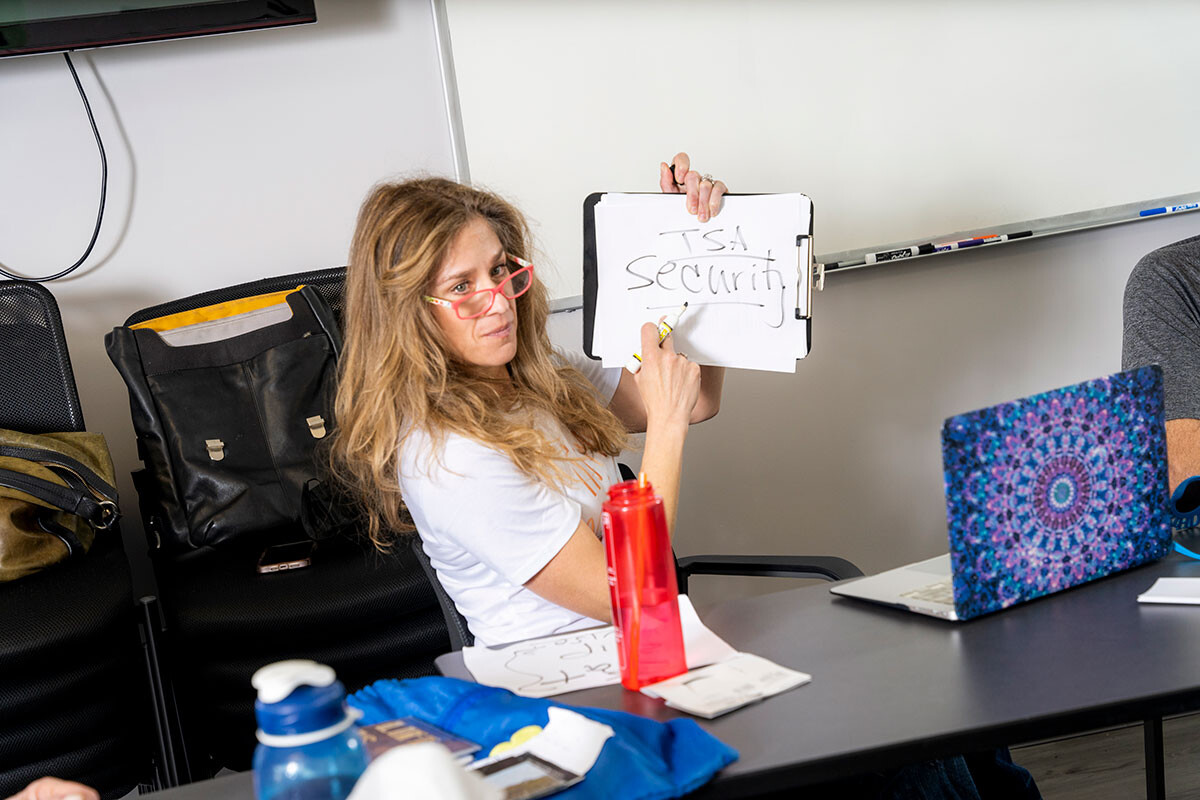Triangle Aphasia Project Unlimited (TAP) estimates that there are tens of thousands of people in North Carolina who currently have aphasia. Despite this, the majority of NC residents have no idea what aphasia actually is.
“Aphasia is a communication disorder that results from injury to the brain (i.e., stroke, traumatic brain injury, tumor, or a progressive disease),” said founder Maura Silverman, MS, CCC/SLP. “Individuals do not suffer from impairment of memory or intellect, rather the language to understand and/or express their thoughts, ideas, and stories. There are four modalities of language (reading, writing, listening, and speech) and any or all of them can be affected by aphasia.”
Silverman, who has worked as a speech language pathologist for the past 30-plus years, was inspired to launch TAP 20 years ago after “advances in rehabilitation science began recognizing the power of neuroplasticity” (the ability for the brain to rewire itself ). The potential for recovery of speech and language functioning required a rethink on how to better serve a population dealing with dwindling health care reimbursement and shortened rehabilitation stays.
“My inspiration in developing and launching TAP was the belief that there was more to be done to help individuals and families impacted by aphasia than our traditional medical model allowed,” said Silverman. “I was not alone in my thinking and creating one of the first dozen Aphasia Centers/ Programs in the country was supported by individuals traveling the aphasia journey (i.e., clients/families) and my husband/family, who said, ‘If not now, when?’”
After founding TAP, Silverman — who for years had seen the struggles of individuals with aphasia and was moved by the challenges of their families — was ushered to the front lines when aphasia hit home.
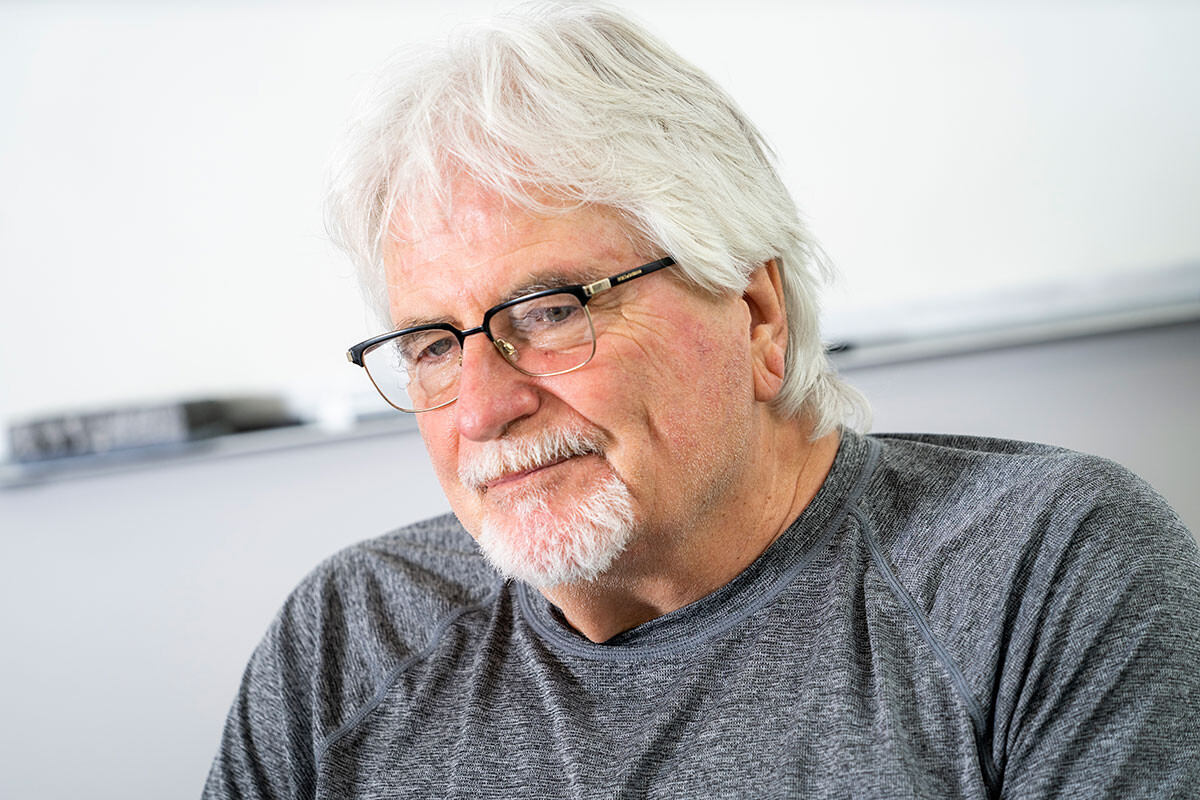
Peter Angne
“On December 17, 2009, my understanding of the impact of aphasia was forever altered, and I shifted from sympathy to empathy,” said Silverman. “My dear, sweet mom, a young, vibrant, prophetic writer, caring nurse, and my biggest fan, suffered a massive left hemisphere bleed. She was left with right motor weakness/hemiparesis, apraxia of speech, and severe nonfluent aphasia. Over the subsequent years, my mom taught me more than any college text or research study could ever teach me. She needed tools and strategies to engage in social gatherings and a communicative partner to assist her in talking to her physician. While she graciously accepted aid, she was determined to reveal her competence, to remain independent and live successfully despite her aphasia. There was no doubt that she made me a better human, but in the end she also made me a better therapist.”
Like Silverman, TAP Executive Director Justine Knight can also speak from a caregiver’s perspective. Knight’s father, who was diagnosed with aphasia following a stroke 15 years ago, has made great strides (and friends) since discovering TAP.
“It’s been amazing to see,” said Knight. “Since moving to North Carolina four years ago, he’s gotten really involved, so he’s practicing his communication skills every day both at the groups and also with the friends he’s met through TAP. That practice and talking to others in the same situation as him has helped build confidence. It’s been 15 years since the stroke, and you would typically assume that people stop improving at some point, but now we know that that’s not the case. It’s like any other muscle — when people keep practicing their communication skills, they get better. Today my dad is more talkative than anyone I know.”
Silverman describes TAP as a hub and spoke model — with an office (hub) in Cary and groups/programming (spokes) out in the communities where people live, work, and play. This model allows TAP to reach across the state and provide virtual and in-person programming for clients by collaborating with NC hospital systems, rehabilitation programs, private practices, and universities.
“We start by doing a consultation with every new client to learn about their experience with aphasia and figure out which of our programs are best for them,” said Knight. “After that, clients are welcome to join groups. You can attend one group one week, 20 groups the next week; it’s totally up to you and your schedule. It’s very easy for people to pop in and out, but we do find that once people start getting involved in TAP that they stay with us for a long time, if not forever.”
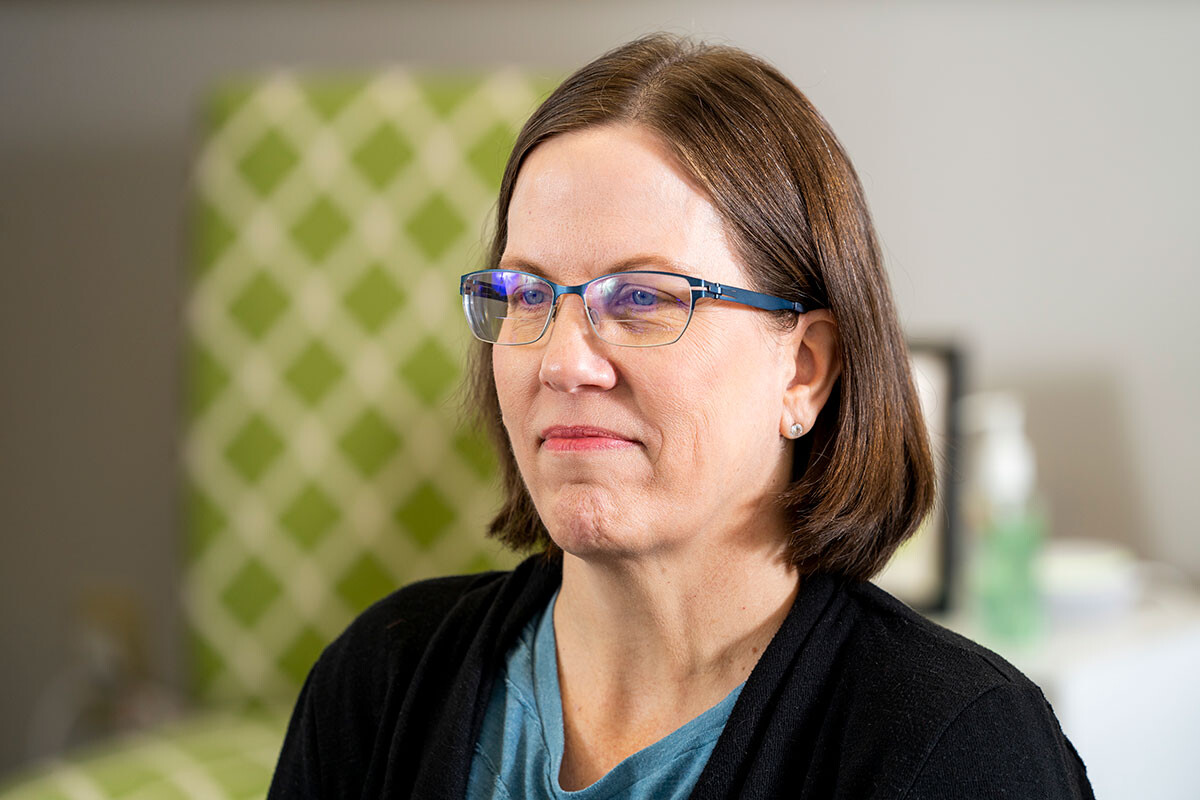
Andrea Richards
In-person meetings in the Cary office have recently started up again, but for now the majority of their group classes remain on Zoom. For less than $10 a class, clients can access an abundance of virtual groups, led by speech therapists, for just about every interest. Examples of groups include TAP into Talking, which focuses on verbal expression, TAP Movie Club, TAP Virtual Vacations, TAP’s Nuestro Encuentro (for Spanish speakers), TAP Back to Work Group, and one of their most popular groups — TAP Zoom Into the Bible. Support groups for clients and loved ones are free, as well as their Learning to Speak Aphasia online training, offered monthly for family, friends, and those serving in the community.
“Sometimes you can find support groups, but it’s not therapy, and so what TAP offers is something in the middle,” said Knight. “It doesn’t go through insurance, it costs just a handful of dollars per group, and they also get the support from other people because they’re in these groups together. We also do customized family trainings, if requested — so we’re providing resources for the whole family. Workplaces, even.”
In 2022, Army veteran and TAP client Genty McFarland was diagnosed with cancer. During the two months spent undergoing treatment, McFarland suffered multiple strokes, leading to aphasia — a diagnosis that left her feeling helpless.
“My family has been incredibly supportive, and we were fortunate to find Triangle Aphasia, a nonprofit organization that provides resources and support for people living with aphasia,” said McFarland. “The staff and my fellow group members at Triangle Aphasia have become like family to me. The group meetings, which take place six days a week, have added joy to my day and reminded me that I am not alone on this journey. Each group has its own unique spirit and energy, and participating in them has given me a renewed sense of purpose and connection.”
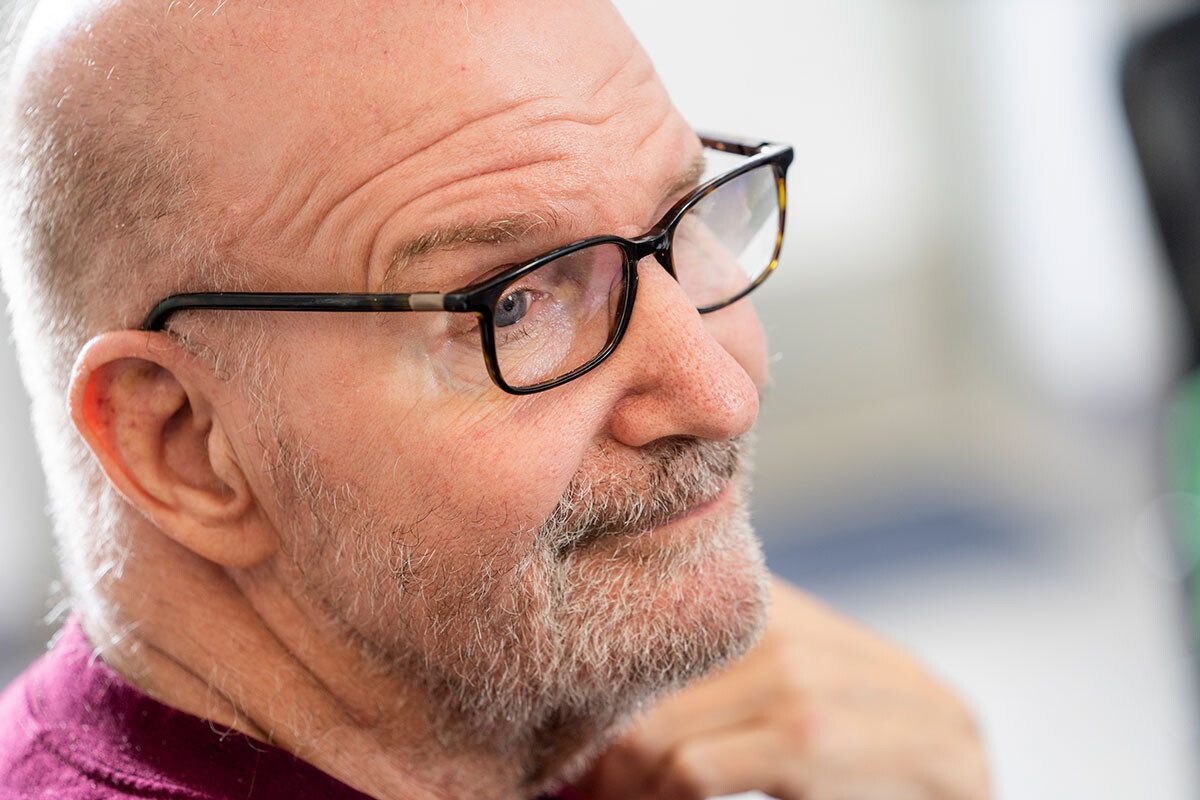
Peter Andrews
Unfortunately, there are few resources out there for individuals with aphasia — which can be an incredibly isolating condition. TAP believes that everyone deserves a good quality of life and the chance to connect with others, resume their passions, and improve their communication. Their life participation approach encourages people to get back to their lives.
“We don’t want them to withdraw from the world once they have aphasia,” said Knight. “We want them to go back into the world confident and capable and having the tools they need to succeed. So many people withdraw, and that’s just no way to live.”
Potential volunteers are encouraged to visit their website and fill out an interest form (or simply call or email). TAP is always looking for one-time event volunteers, people to help out in the office, or board members/committee members who can help with long-term planning.
“I believe that it takes a community to support us in our times of need, and I am grateful for the network of professionals and organizations who work together to help people like me,” said McFarland. “I hope that my story will inspire others to seek out the support they need and to never give up hope.”
- 2023 Maggy Awards: Shopping
- 2023 Maggy Awards: Services
- Cary Magazine Presents the 2023 Maggy Awards
- 2023 Maggy Awards: Lifestyle
- 2023 Maggy Awards: Restaurants
- Things to Do: April 2023
- Small Business Spotlight: Good Day Cary
- Erica Chats: Erica’s Maggy-Winning Picks
- Nonprofit Spotlight: Triangle Aphasia Project Unlimited
- Chasing Her Dreams
- On Trend: Vintage Jewelry
- Restaurant Spotlight: M Sushi at Fenton
- Liquid Assets: Peaceful Oasis
- Liquid Assets: Fresh Start
- Garden Adventurer: A Fish Tale



